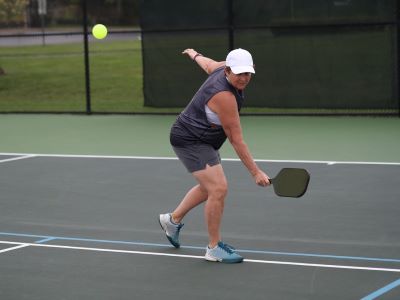Pickleball is a sport that brings out the best and the worst in players. It can be thrilling, challenging, and rewarding but also frustrating, confusing, and annoying. One of the reasons for pickleball is poaching.
So, what is poaching in pickleball? Is it a good or bad thing? How do you do it right? And is it legal? In this article, we will answer all these questions and more.
Read on to learn everything you need about pickleball poaching before playing!
What Is Poaching in Pickleball?
Poaching in pickleball is when a player moves from their position on the court to intercept a ball intended for their partner or opponent. Poaching can be done by either the serving or the receiving team, and it can be done at any time during a rally.

Poaching is not illegal in pickleball, but it can be considered rude or unsportsmanlike by some players.
Why Poach on the Pickleball Court?
There are several reasons why a player might want to poach on the pickleball court. Some of the most common ones are:
- To take advantage of a weak or predictable shot by the opponent
- To surprise or intimidate the opponent with an aggressive move
- To cover for a partner who is out of position or unable to reach the ball
- To show off their skills or confidence
- To have more fun or challenge themselves
Poaching can be an effective strategy to win points and games in pickleball if it is done with skill, timing, and communication.
How to Poach for Points in Pickleball?
If you want to poach for points in pickleball, here are some tips to follow:
- Communicate with your partner before and during the game. Let them know your intention to poach and signal them when you will do it. It will help avoid confusion and collisions on the court.
- Choose your moments wisely. Don’t poach every ball or every time your partner is about to hit. Look for opportunities when the opponent hits a weak or high ball that you can easily reach and put away.

- Be quick and decisive. When you can poach, move fast and hit the ball with authority. Don’t hesitate or second-guess yourself; this will give the opponent time to react and counter your move.
- Be aware of your position and the no-volley zone. When you poach, make sure you don’t cross into the no-volley zone (also known as the kitchen) before hitting the ball, as this will result in a fault. Also, ensure you don’t leave your side of the court exposed or vulnerable to an easy shot by the opponent.
- Be respectful and courteous. Don’t poach to show off, taunt, or humiliate your opponent or partner. Don’t poach if it will interfere with your partner’s enjoyment or performance. Don’t poach if it will cause conflict or tension among players. Poach only if it enhances your game and makes it more fun for everyone.
When Not to Poach in Pickleball?
There are also some situations when you should not poach in pickleball, such as:
- When your partner is playing well and doesn’t need your help
- When your partner is hitting a better shot than you can
- When your partner has asked you not to poach or prefers to play their side
- When your opponent is hitting too hard or too low for you to poach
- When you are not confident or skilled enough to poach successfully
- When you are playing with beginners or casual players who might not appreciate your poaching
Is Poaching Legal in Pickleball?
As we have seen, poaching can be a great way to win points and games in pickleball, but is it legal? According to official rules, the answer is yes; poaching is legal in pickleball. No rule prohibits a player from crossing the centerline of the court to hit a ball on their partner’s side, as long as they do not touch the net or the no-volley zone with their paddle or body.
However, just because poaching is legal does not mean it is always appropriate or appreciated by other players. Poaching can also be seen as a breach of etiquette or sportsmanship by some players, especially if done excessively, unnecessarily, or disrespectfully.
Poaching is legal in pickleball but is only sometimes ethical or polite. Poaching can be a powerful weapon in your pickleball arsenal, but it can also be a double-edged sword that can backfire on you or hurt your relationships with other players. Therefore, use poaching wisely and respectfully, and always remember the golden rule of pickleball etiquette: have fun!
FAQs
Yes, you can poach on a serve in pickleball, but it’s not always the best strategy. Poaching involves moving into your partner’s area to intercept a shot. However, in pickleball, the serve is often the strongest shot, so it may be better to stay back and defend.
Poach means crossing over the centerline or boundary of the court to hit a ball intended for another player. Poaching can be done by either the serving or the receiving team, and it can be done at any time during a rally. Poaching is usually an aggressive and unexpected move that can pressure opponents.
Stacking is a strategy in pickleball where the partners switch positions on the court to have a preferred player in a certain spot. For example, some players prefer to have their forehand in the middle of the court or to have the stronger player at the net. Stacking can be done by either the serving team or the receiving team, and it requires good communication and coordination between the partners.
Well, Let’s Wrap Up!
Poaching in pickleball is when a player moves from their position on the court to intercept a ball intended for their partner or opponent. Poaching can be a fun and effective way to win points and games in pickleball, but it can also cause problems if done incorrectly or excessively.
To poach successfully and respectfully, you must communicate with your partner. You must choose your moments wisely, be quick and decisive, know your position and the no-volley zone, and be courteous to your opponent.
We hope this article has helped you understand poaching in pickleball, why people do it, how to do it, when not, and whether it is legal. If you have questions or comments, leave them below. Happy poaching!

I am a professional physiotherapist and the author of the BallSportsPro. I worked with athletes of all levels, from amateur to professional, and i helped them overcome injuries and improve their performance. I am a certified Pickleball instructor and has been playing the sport for over 10 years.




